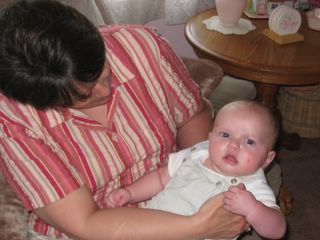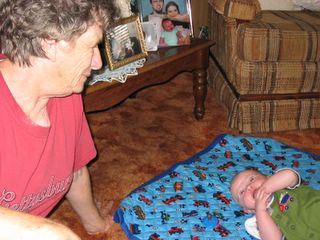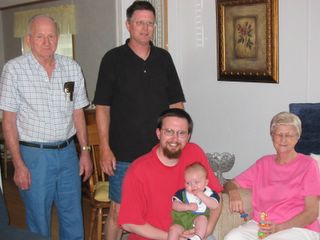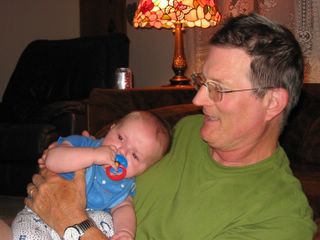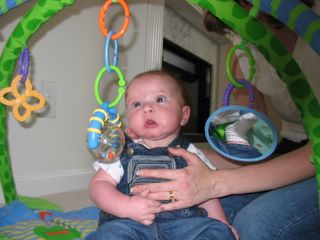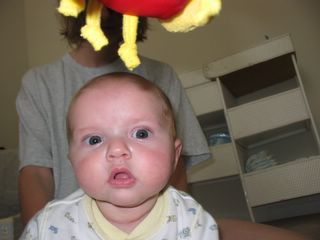
14 August 2005
08 August 2005
Unease with Libertarianism
I was thinking about politics today, particularly about the terms in which politics could more helpfully be talked about. As it stands, folks in the churches I know and love generally talk about "issues" without really engaging what it means for people to be political or rational or even spiritual animals, and I think that our Christian witness suffers for it; if we're merely partisans of one or another American political faction, to what extent can we call our common witness Christian?
More specifically I was thinking about wealth and the ways we speak about it. It's no big surprise that capitalism is the dominant economic ideology in the lands claimed by Washington. But the church's unwillingness (or inability) to speak critically about such things is troubling. While churches agree and disagree about whether or not centralized governments should regulate lying or sex or those such things, nobody seems to question the purely monetary model of "property" that underlies the way that we live together.
Even Plato seems to have known better. In his Republic, the city is the locus of property. The producers generate material goods and perform specialized services, and the civil servants police things and fight wars, and the philosopher-kings rule using noble lies among their other stately tools (I'm becoming more and more convinced that the U. of Chicago group, the students of Leo Strauss, are intentionally reclaiming this Platonic tool). What is proper to each class, and thus to each person, is duty and function. There's no sense that any of the producers is thinking that "my" crops or coins or whatever are ending up in the hands of the kings; rather, the city itself is the "proper" steward of these things. Later, in monastic life, similar things happen--whatever was once proper to this or that man becomes the common "property" of the community, and each monk's "property" becomes not a monetary holding but a participation in a larger social body.
But modern notions of property, whether capitalist or communist, seem to presuppose "property" as a liquid asset, something to be bought and sold without any eye for its function as a communal good. Marx is no less guilty of this than any capitalist; the revolution presupposes that a finite, liquid pool of resources is the aim of the revolution (if I've got this wrong, any Marx scholar is quite welcome to correct me). In The German Ideology, the end of revolution seems to be a collection of functionally equivalent individuals, not any sort of community.
In libertarian/Republican frameworks, it's even scarier and even more Nietzschean. It doesn't matter how the rich got rich or the powerful got powerful; their duty is to retain that power and money. Not to do so would be to cave in (according to Nietzshce) to the ethics of resentment (echoed in the last fifteen years or so by Limbaugh and company's rants about "class warfare"). If a few of the poor win or deal or work themselves to death and earn a little wealth, the moneyed class points to them with great rejoicing and says that "anyone can make it in America." But if someone points to the thousand who can't accumulate wealth, even while working themselves to death, it's "class warfare." In the meantime, they continue to congratulate themselves for being wealthy and powerful, sneering at the working poor as "the lazy class."
I'll probably post more on this in the days to come; right now, I'm just trying to establish some sort of theoretical framework within which I can talk and write about national politics without automatically falling into one or another megaparty's camp and, more importantly, without assuming that the nation to whom a person pays taxes automatically becomes that person's primary political identity-maker. More later.
More specifically I was thinking about wealth and the ways we speak about it. It's no big surprise that capitalism is the dominant economic ideology in the lands claimed by Washington. But the church's unwillingness (or inability) to speak critically about such things is troubling. While churches agree and disagree about whether or not centralized governments should regulate lying or sex or those such things, nobody seems to question the purely monetary model of "property" that underlies the way that we live together.
Even Plato seems to have known better. In his Republic, the city is the locus of property. The producers generate material goods and perform specialized services, and the civil servants police things and fight wars, and the philosopher-kings rule using noble lies among their other stately tools (I'm becoming more and more convinced that the U. of Chicago group, the students of Leo Strauss, are intentionally reclaiming this Platonic tool). What is proper to each class, and thus to each person, is duty and function. There's no sense that any of the producers is thinking that "my" crops or coins or whatever are ending up in the hands of the kings; rather, the city itself is the "proper" steward of these things. Later, in monastic life, similar things happen--whatever was once proper to this or that man becomes the common "property" of the community, and each monk's "property" becomes not a monetary holding but a participation in a larger social body.
But modern notions of property, whether capitalist or communist, seem to presuppose "property" as a liquid asset, something to be bought and sold without any eye for its function as a communal good. Marx is no less guilty of this than any capitalist; the revolution presupposes that a finite, liquid pool of resources is the aim of the revolution (if I've got this wrong, any Marx scholar is quite welcome to correct me). In The German Ideology, the end of revolution seems to be a collection of functionally equivalent individuals, not any sort of community.
In libertarian/Republican frameworks, it's even scarier and even more Nietzschean. It doesn't matter how the rich got rich or the powerful got powerful; their duty is to retain that power and money. Not to do so would be to cave in (according to Nietzshce) to the ethics of resentment (echoed in the last fifteen years or so by Limbaugh and company's rants about "class warfare"). If a few of the poor win or deal or work themselves to death and earn a little wealth, the moneyed class points to them with great rejoicing and says that "anyone can make it in America." But if someone points to the thousand who can't accumulate wealth, even while working themselves to death, it's "class warfare." In the meantime, they continue to congratulate themselves for being wealthy and powerful, sneering at the working poor as "the lazy class."
I'll probably post more on this in the days to come; right now, I'm just trying to establish some sort of theoretical framework within which I can talk and write about national politics without automatically falling into one or another megaparty's camp and, more importantly, without assuming that the nation to whom a person pays taxes automatically becomes that person's primary political identity-maker. More later.
30 July 2005
High Level Literary Theory and the Amateur
I should have noticed when I read Lentricchia's "Confessions of an Ex-Literary Critic" years ago, but I've realized recently why I can't get on board, at least not all the way, with the various "hermeneutics of suspicion" movements: I'm just not jaded enough.
Perhaps, years from now, when Chaucer and Shakespeare and Milton have said to me all they have to say (may the day never come!), when Dickens ceases to shock and shame me into awareness of the poor (may my heart never be so hard!), when Ovid and Sophocles stop looking so darn classical in my starstruck eyes (may I go blind first!)--perhaps then I'll be interested in their Marxist "secret agendas" or in their "deep structural" oppressive characters. Perhaps when that day comes, I'll be able to join in the ranks of the Wordsworth critics so convinced that they've got him whipped when it comes to avoiding self-delusion.
A pity that day will be.
For now my hermeneutics have to be something more like a "hermeneutics of Malorian worship." When one knight in Morte d' Arthur extolled the worth of a superior, through words and through symbolic actions such as bowing and presenting arms, Malory without hesitation called that action "worship." Now I'm not talking about the nasty latria stuff that gets people in a bind about idol-latria and such. No, just the acknowledgment that Malory and Marlowe and Herbert and Coleridge are more worthy knights than Gilmour.
Perhaps this hermeneutical stance will work its way into my dissertation or research. Maybe not. But that's three blog posts in two days--my little mind must be bearing some crazy fruit!
Perhaps, years from now, when Chaucer and Shakespeare and Milton have said to me all they have to say (may the day never come!), when Dickens ceases to shock and shame me into awareness of the poor (may my heart never be so hard!), when Ovid and Sophocles stop looking so darn classical in my starstruck eyes (may I go blind first!)--perhaps then I'll be interested in their Marxist "secret agendas" or in their "deep structural" oppressive characters. Perhaps when that day comes, I'll be able to join in the ranks of the Wordsworth critics so convinced that they've got him whipped when it comes to avoiding self-delusion.
A pity that day will be.
For now my hermeneutics have to be something more like a "hermeneutics of Malorian worship." When one knight in Morte d' Arthur extolled the worth of a superior, through words and through symbolic actions such as bowing and presenting arms, Malory without hesitation called that action "worship." Now I'm not talking about the nasty latria stuff that gets people in a bind about idol-latria and such. No, just the acknowledgment that Malory and Marlowe and Herbert and Coleridge are more worthy knights than Gilmour.
Perhaps this hermeneutical stance will work its way into my dissertation or research. Maybe not. But that's three blog posts in two days--my little mind must be bearing some crazy fruit!
29 July 2005
N.T. Wright, Again
I just finished the second volume of N.T. Wright's series Christian Origins and the Question of God, and Jesus and the Victory of God was just as great as the first volume. Wright engages and critiques many scholarly commonplaces and checks the excesses of post-deistic "orthodoxy" on his way to a picture of Jesus that at once takes into account all of the disparate parts of the synoptic gospels and yet, or perhaps as a consequence, leaves Jesus a truly compelling, mysterious, and human figure.
With regards to Jesus' vocation, Wright demonstrates that the role of an apocalyptic Jewish prophet is the starting point from which his teachings and symbolic actions make most sense. Proceeding from there, he shows quite nicely how the prophetic vocation expands in the person of Jesus until he becomes a symbolic embodiment of YHWH's purposes and even the embodiment of YHWH's own self on earth.
Wright argues that the transition between first-century, pre-Rabbinic Judaism and first-century, Jewish Christianity needs a middle term, and he spends the bulk of his six-hundred-sixty-two-page book demonstrating that Jesus, as known primarily through the synoptics, is that middle term. When he's done, it seems the only sensible thing to think.
I've got Wright's next book, The Resurrection of the Son of God, on order from amazon, so I'll be digging into it as the semester starts. I can hardly wait.
With regards to Jesus' vocation, Wright demonstrates that the role of an apocalyptic Jewish prophet is the starting point from which his teachings and symbolic actions make most sense. Proceeding from there, he shows quite nicely how the prophetic vocation expands in the person of Jesus until he becomes a symbolic embodiment of YHWH's purposes and even the embodiment of YHWH's own self on earth.
Wright argues that the transition between first-century, pre-Rabbinic Judaism and first-century, Jewish Christianity needs a middle term, and he spends the bulk of his six-hundred-sixty-two-page book demonstrating that Jesus, as known primarily through the synoptics, is that middle term. When he's done, it seems the only sensible thing to think.
I've got Wright's next book, The Resurrection of the Son of God, on order from amazon, so I'll be digging into it as the semester starts. I can hardly wait.
Back from the Road
It doesn't seem like a week since we've been back in Georgia--the month of July just flew. Micah will be five months old in just over a week, and Mary and I will be back in our classrooms.
On the reading front, I've got about fifteen cantos of Dante and a chapter of N.T. Wright I'd like to dust off before I go all-Shakespeare for a few months. On the other hand, I have yet to get digging on the new freshman comp textbook--I've got ideas about what I'd like to do with that class this year, but nothing saved yet.
The nice thing is that I've got a laptop now (typing on it right now), so I'll be able to work on those things in places other than my own computer desk and the assigned computer labs around UGA's campus. I'm still getting used to the smaller keyboard and haven't yet broken out the little mouse I bought with it, but the mobility should be just wonderful.
I'll probably wait until I finish one or the other book to start commenting again; for each I've got some things in mind to write but haven't yet solidified them.
On the reading front, I've got about fifteen cantos of Dante and a chapter of N.T. Wright I'd like to dust off before I go all-Shakespeare for a few months. On the other hand, I have yet to get digging on the new freshman comp textbook--I've got ideas about what I'd like to do with that class this year, but nothing saved yet.
The nice thing is that I've got a laptop now (typing on it right now), so I'll be able to work on those things in places other than my own computer desk and the assigned computer labs around UGA's campus. I'm still getting used to the smaller keyboard and haven't yet broken out the little mouse I bought with it, but the mobility should be just wonderful.
I'll probably wait until I finish one or the other book to start commenting again; for each I've got some things in mind to write but haven't yet solidified them.
25 July 2005
09 July 2005
Road Trip
Tomorrow I preach my first sermon in two and a half years, load up the car, and take off for Indiana. I'm already realizing that this is going to be a catch-22; if Micah sleeps at night, he's going to be awake and mad he's in a car seat all day. If he sleeps in the car, he's going to be awake and expecting Mom and Dad to be awake all night. There's just no winning. But perhaps it won't be so bad--it's just my first road trip as Dad.
30 June 2005
Which theologian am I?
You scored as Karl Barth. The daddy of 20th Century theology. You perceive liberal theology to be a disaster and so you insist that the revelation of Christ, not human experience, should be the starting point for all theology.
Which theologian are you? created with QuizFarm.com |
26 June 2005
25 June 2005
Dante is it
I'm ten cantos into Paradise, and once again Dante amazes me. This will be my fourth read through all three canticles, and the poetic power of the man never wanes. Like Milton (my other poetic/theological master), Dante manages to dramatize convincingly some of the theological controversies that just don't work out in proposition-lists. His treatment of prayer in Purgatorio is simply inspired. And his imperialism (in the Roman sense), though it's a blemish in his theology, still comes across as entirely sensible (even if wrongheaded).
One day, when I'm teaching college, if the school will give me some wiggle-room, I'm almost certain I'll teach a Dante and Milton class--yes, the syllabus is forming in my head even now.
One day, when I'm teaching college, if the school will give me some wiggle-room, I'm almost certain I'll teach a Dante and Milton class--yes, the syllabus is forming in my head even now.
21 June 2005
19 June 2005
18 June 2005
Syllabus Quote
I think I'll lead off my ENGL 1101 syllabus with the following quote:
Dr. Kenneson led off his ancient philosophy syllabus with this gem, and I think about it often when I hear about how snotty college kids are, coming home on breaks with all their new ideas. I'm not sure from where in Epictetus these lines come, but I'll find them soon enough.
On no occasion call yourself a philosopher, and do not talk a great deal amongst uneducated people about philosophical principles, but do what follows from those principles. For example, at a banquet do not talk about how people ought to eat, but eat as someone should... And if a discussion about philosophical principles should arise in uneducated people, keep silent for the most part, for there is great danger that you will immediately vomit up what you have not yet digested. And when someone says to you that you know nothing, and you are not offended, then know that you have begun your work. For sheep do not present their fodder to the shepherd to show how much they have eaten, but they digest their food within to produce wool and milk on the outside. So do not display your philosophical principles to uneducated people, but show them the actions that result from the principles when you digest them.
Dr. Kenneson led off his ancient philosophy syllabus with this gem, and I think about it often when I hear about how snotty college kids are, coming home on breaks with all their new ideas. I'm not sure from where in Epictetus these lines come, but I'll find them soon enough.
15 June 2005
12 June 2005
10 June 2005
07 June 2005
04 June 2005
Another Run through Dante
I'm nearly 30 cantos into my most recent reading of the Comedy, and once again I find myself wishing I'd learned Italian instead of Spanish. Ah, well. Mark Musa's translation is more than adequate to keep my Dante addiction sated.
Beyond that, house-settling keeps getting delayed. We've put in a few hours, and it already looks better, but I can only hope that next week (before Thursday, when Mary has curriculum meetings) yields some more productive hours.
Beyond that, house-settling keeps getting delayed. We've put in a few hours, and it already looks better, but I can only hope that next week (before Thursday, when Mary has curriculum meetings) yields some more productive hours.
Subscribe to:
Posts (Atom)









